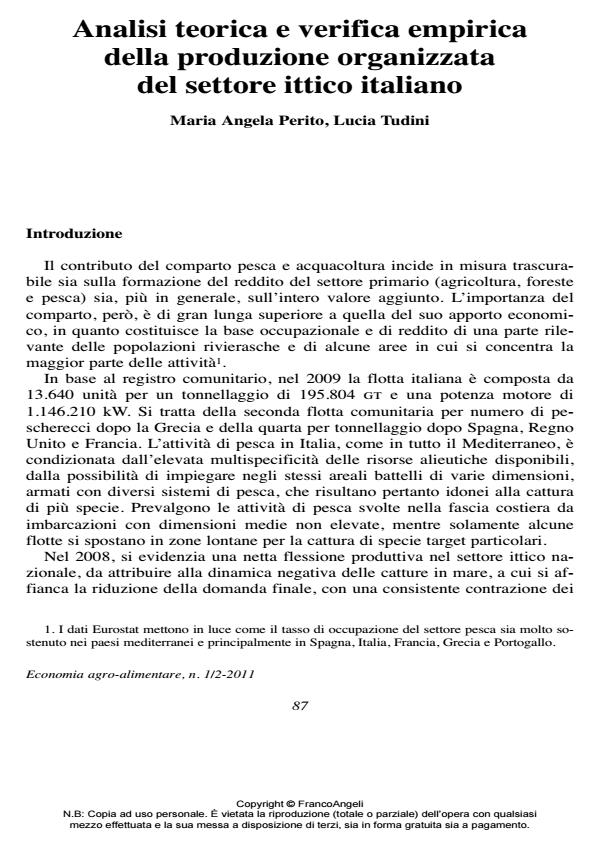Theoretical and empirical analysis of the organized production of the italian fishing sector
Journal title ECONOMIA AGRO-ALIMENTARE
Author/s Maria Angela Perito, Lucia Tudini
Publishing Year 2011 Issue 2011/1-2
Language Italian Pages 15 P. File size 513 KB
DOI 10.3280/ECAG2011-001005
DOI is like a bar code for intellectual property: to have more infomation
click here
Below, you can see the article first page
If you want to buy this article in PDF format, you can do it, following the instructions to buy download credits

FrancoAngeli is member of Publishers International Linking Association, Inc (PILA), a not-for-profit association which run the CrossRef service enabling links to and from online scholarly content.
The fishery and aquaculture sector constitutes a negligible part on income formation of the primary sector and, more generally, on value added. The importance of the sector, however, is far superior to that of its economic contribution, as it forms the basis of employment and income of a significant part of the coastal population and some areas where most of the activity is concentrated. Starting from this basic consideration and the opportunities afforded by Council Regulation (ec) No 104/2000, the objective of the paper is to analyze the problems of the sector and the possibilities of certain solutions according the reform of the Common Organisation of the markets in fishery and aquaculture products. In particular, the purpose of the reform was to develop the role of Producer Organisations (pos) with the aim of making markets more competitive and strengthen their bargaining power with the rest of the marketing chain. However, to date, the role of pos at national level remains little studied and evaluated, although it takes a major importance in view of the revision of the Common Fisheries Policy. The paper analyzes the pos currently operating in Italy, the relations in "a horizontal line" for the constitution of associations of pos and in "a vertical line" with the downstream operators. In parallel, the theory of neo-institutional approach is the "toolbox" approach in order to carry out the analysis on the capacity of pos to implement measures to encourage the planning of production and adaptation to demand, both from terms of quantity and quality, as required by eu regulation.
Keywords: Fishery and aquaculture supply chain, producer organisations, common fisheries policy
Jel codes: Q18, D23, L14
Maria Angela Perito, Lucia Tudini, Analisi teorica e verifica empirica della produzione organizzata del settore ittico italiano in "ECONOMIA AGRO-ALIMENTARE" 1-2/2011, pp , DOI: 10.3280/ECAG2011-001005